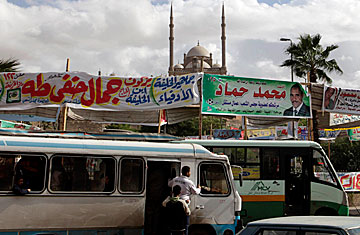
Election banners in Cairo on Nov. 14, 2011, ahead of Egypt's parliamentary elections
(2 of 2)
The parties are so numerous and the campaign period so short that most people have trouble naming more than a handful of political organizations. The Islamist Muslim Brotherhood, formerly Mubarak's strongest opposition, is one of the only groups with any politicking experience, and weaker parties savvy enough to know their odds have thrown in their lot with the Brotherhood-led Democratic Alliance. That includes Mubarak's former presidential challenger and a favorite of the Bush Administration, Ayman Nour, who played second fiddle to the Islamists at a recent Democratic Alliance rally in north Cairo where a gender-segregated audience listened to mostly Brotherhood campaign speeches.
For those who don't support the Islamists, the options have been even hazier. Most of the parties contesting the parliamentary vote are new, unskilled and lack credibility. Those who have experience are accustomed to Mubarak-era-styled candidacies, in which family and connections matter more than platform and everything is expected to be rigged at the end of the day. The fruit vendor Abdallah is hardly the only one who feels suspicious.
"No party can solve our problems. We have very big problems," says Heba Hassan, a nutritionist, who, despite her indifference to the parties, spoke to TIME while meeting with other academics over a plan to pressure the Ministry of Higher Education to crack down on corruption.
Even the candidate Hamzawy dodged voters' queries for details of his campaign program on a recent night. "The program is online and in the newspapers," said the former political analyst before being interrupted by a disgruntled voter who said, "No one reads the program!" Underlying all the apprehensiveness and confusion, some say, is also simply fear: fear of the unknown, fear of an Islamist win, fear of a revolution unfinished. "They're in shock — most Egyptians," says Mohamed, a nightclub owner in the capital. "They don't know what's wrong and what's right. Hosni Mubarak has fallen down. The pyramid fell down. So they don't trust anyone."
There is a national obsession with the threat of the felool — literally, "remnants" of the regime. They're out there and they're ubiquitous, the rhetoric goes, and they're plotting to get back to power through any means necessary. A ruling by the country's High Administrative Court on Monday dismissed a provincial court's ban on the candidacies of former NDP members, sparking outrage. One group of activists has set up a website, emsekflol.com (Catch Remnants), which lists former ruling-party members, candidates or not, by district and governorate, encouraging voters to take the battle into their own hands. "The Democratic Alliance is the only alliance that doesn't have remnants," Mohamed Bayoumi, a liberal candidate on the Democratic Alliance list, told a crowd of prospective voters last Friday night.
Indeed, after decades of authoritarian rule, it may be only natural that Egyptians have their doubts about who to choose in what will likely be the most important election in Egypt's history thus far. "Thirty years is not a short time," says the nightclub owner who, like many Egyptians, still fears the regime's ever watchful state security enough not to give his last name. "I was a kid [when Mubarak took power] and now I'm a father," he says. "They put this thing inside of us: fear of the future, fear of strangers. Just fear. What happened over 30 years, you cannot change it in 15 minutes."
